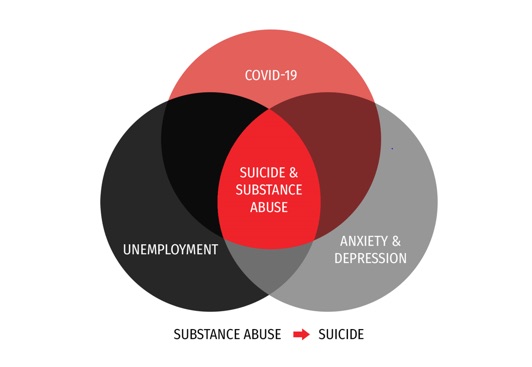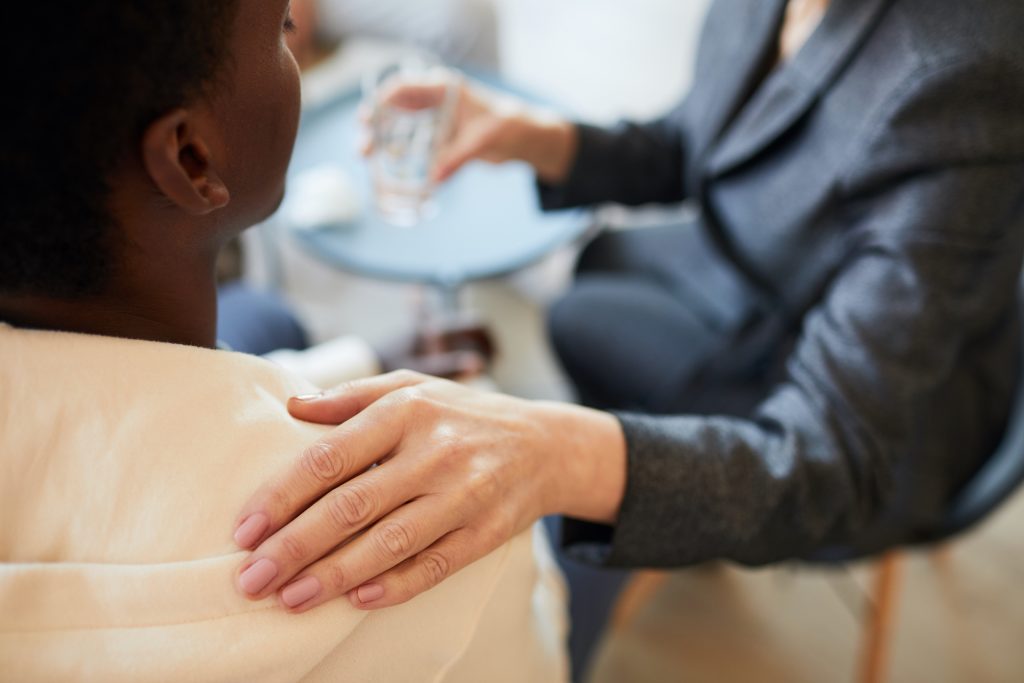The Relationship of COVID-19
Substance Abuse and Suicide
Where to Call for Help
Gregg Raduka, Ph.D., LPC, ICPS
Posted: July 6, 2020
As the diagram below shows, COVID-19 1, anxiety and depression, and unemployment2 have all been shown to contribute to substance abuse and suicide. And increases in substance abuse also contribute to increases in the rate of suicide.3

Per the US Substance Abuse and Mental Health Services Administration (SAMHSA), “There are 57.8 million Americans living with mental and/or substance use disorders (National Survey on Drug Use and Health, 2018). Currently, suicide is the 10th leading cause of death in our nation. The current national COVID-19 crisis will certainly contribute to the growth in the number of Americans needing urgent care to address mental health needs, including suicidality. Americans across the country will struggle with increases in depression, anxiety, trauma, grief, isolation, loss of employment, financial instability and other challenges, which can lead to suicide and suicide attempts.” 4
Per a SAMHSA brief, “While multiple factors influence suicidal behaviors, substance use—especially alcohol use—is a significant factor that is linked to a substantial number of suicides and suicide attempts. While multiple factors influence suicidal behaviors, substance use—especially alcohol use—is a significant factor that is linked to a substantial number of suicides and suicide attempts. This “nexus” between substance use and suicide provides an opportunity for behavioral health leaders to develop a cohesive strategy within a public health framework to reduce suicidal behaviors and suicide rates.”3
One of the first indications that a problem is brewing is the lethality of reported suicide attempts in emergency rooms across the country, said Dr. McCance-Katz, SAMHSA’s Director, regarding the COVID-19 pandemic. In April, calls to a national mental health hotline increased by 1,000% over the same period last year, she said. 5
Per the 2020 findings of the National Survey on Drug Use and Health (NSDUH), “The COVID-19 pandemic has spotlighted racial and ethnic disparities in access to behavioral health care. While their rates of behavioral health disorders may not significantly differ from the general population, Blacks and Latinos have substantially lower access to mental health and substance-use treatment services as shown below. 6

Numbers to Call and Websites to Visit for Help
However, there are resources to help those in need or those seeking help for others in need. Two of these resources are:
- For access to substance abuse and suicide prevention and treatment services and immediate crisis help, call the Georgia Crisis & Access Line(GCAL) at 1-800-715-4225, available 24/7 to help someone you are providing services for in a crisis.
GCAL professionals will:
- Provide telephonic crisis intervention services
- Dispatch mobile crisis teams
- Assist individuals in finding an open crisis or detox bed across the State
- Link individuals with urgent appointment services
In addition, GCAL will help you to access a State Funded provider in your area in a non-emergency as well.
- You can also call 1-800-273-8255, SAMHSA’s National Suicide Prevention Lifeline or go to https://suicidepreventionlifeline.org/, a national network of local crisis centers that provides free and confidential emotional support to people in suicidal crisis or emotional distress 24 hours a day, 7 days a week.
References:
- www.thelancet.com/psychiatry, Vol. 7, June 2020;
- https://www.thelancet.com/journals/lanpsy/article/PIIS2215-0366(20)30141-3/fulltext
- Substance Abuse and Mental Health Services Administration. (2016). Substance Use and Suicide: A Nexus Requiring a Public Health Approach. In Brief.
- https://www.samhsa.gov/newsroom/press-announcements/202005131138
https://www.samhsa.gov/sites/default/files/covid19-behavioral-health-disparities-black-latino-communities.pdf; https://www.samhsa.gov/data/data-we-collect/nsduh-national-survey-drug-use-and-health
